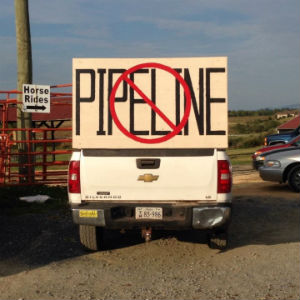
On the one side, two multibillion-dollar energy companies. The other: landowners, environmentalists, conservationists.
The little guy never wins these kinds of fights.
Even though, in this case, the little guy was actually a lot of little guys, and gals, and they had a great plan – to fight Dominion Energy and Duke Energy tooth, nail, kitchen sink and otherwise.
It had seemed an inevitability from the day it was announced in 2014.
It was telling that the announcement from the power companies that they were abandoning their $8 billion, 600-mile-long pipeline was dropped on a Sunday, on July Fourth weekend.
Good PR folks know to dump bad news on weekends and holidays.
It wasn’t bad news for most in these parts, of course.
“No Pipeline!” signs are ubiquitous in front yards, storefronts, along roadways.
Consider the fight won. There will be “No Pipeline!”
“The Atlantic Coast Pipeline was an anvil that would have stymied investment in renewable energy for decades, harmed vulnerable communities, and crushed mountainsides,” said Greg Buppert, a senior attorney at the Southern Environmental Law Center, one of the architects of the effort to fight the energy companies on the proposed pipeline.
“Now this risky and unnecessary project is on the scrap heap where it belongs, and the decks are cleared. Virginia and North Carolina can embrace a clean energy future, and people all along the route can finally rest,” Buppert said.
The effort ended up with a coalition of more than 50 organizations in Virginia and West Virginia that collaborated on strategy to try to block the pipeline.
The coalition, styled the Allegheny-Blue Ridge Alliance, met regularly to discuss pipeline issues, plan strategy, and investigate the expected harm from the project.
The work also included cultivating relationships with the local media, keeping reporters up to date on court proceedings, reviews of permit requests and community forums that were organized to try to give voice to the significant opposition to the plans.
The full effect of that work – the signs, ever present in communities along the proposed pipeline route, the challenges to permits, the legal challenges – had a noticeable effect on the project’s bottom line.
Dominion Energy and Duke Energy noted in their Sunday press release that the delays incurred in buildout had raised the price tag from the $4.5 billion to $5 billion range that had been projected at the outset to more toward the $8 billion range.
And that was assuming that the pipeline wouldn’t be online until 2022 at the earliest, which, considering another wrinkle that was thrown into the plans – the Virginia Clean Economy Act, which was passed by the General Assembly in the spring and took effect last week, and requires Dominion Energy to be 100 percent carbo-free by 2045 – didn’t offer much in terms of time to be able to recoup the costly investment.
Elections, then, matter.
Permit challenges matter.
Being willing to go to court to see to it that companies are held to the letter of the law matters.
America can feel like a corporate oligarchy disguised as a representative democracy, but then, this just happened.
The little guy can win.
It’s great to know.
Story by Chris Graham









